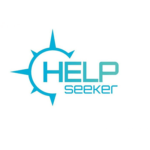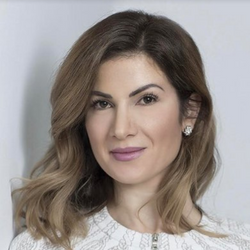
Growing A Company Through Diversity and Reconciliation
AN IMPACT STORY
How HelpSeeker puts an equity lens on everything they do.
Diversity and reconciliation are at the heart of fast-growing HelpSeeker.
 It’s been a whirlwind year for HelpSeeker. In 2020, the social enterprise employed nine people in Calgary. In just one year, HelpSeeker has grown dramatically, now with 53 team members and counting, across Canada.
It’s been a whirlwind year for HelpSeeker. In 2020, the social enterprise employed nine people in Calgary. In just one year, HelpSeeker has grown dramatically, now with 53 team members and counting, across Canada.
HelpSeeker is addressing complex social challenges such as addictions, homelessness, domestic violence and poverty – issues exacerbated by COVID-19.
In response, the organization is leading Leveraging AI in Canada’s Social Response to COVID, a Digital Supercluster project involving seven partners from across the country. Together, they’re using data and artificial intelligence to help government and community leaders anticipate the social needs of Canadians before they become crises.
“Given our focus is on social issues, we have an equity lens in all that we do,” says Dr. Alina Turner, Co-President and Co-Founder of HelpSeeker.

“One of our five core values is ‘action on reconciliation, equity, diversity, inclusion and sovereignty’,” Alina adds. “What that looks like in practice is interesting. It’s one thing to declare it and another to do it. For instance, this value now shows up in our hiring practices and performance evaluations, as well as our technology development and machine learning projects, workflows and quarterly plans.”
HelpSeeker’s VP of Community Success is Indigenous and leading the culture-building process across departments.
“We have learned that we want diverse experiences and perspectives to permeate our entire organization. We understand that accountability for reconciliation and equity has to be a priority for all team members.”
Diversity is reflected throughout the team – for example, 70 per cent of employees are women, 50 per cent are from racialized communities and 20 per cent identify as LGBTQ or non-binary. The team is also made up of a dynamic mix of social science and policy experts and technology professionals. Alina says, “creativity happens when there is debate and a positive tension between colleagues of diverse backgrounds.”
The collaborative innovation within HelpSeeker and with the Digital Supercluster community is leading to growth and positive outcomes. For example, HelpSeeker has sold one of its digital solutions to seven communities in Alberta to track and address local homelessness. The Government of Alberta is also working with HelpSeeker to better deal with domestic abuse.
The organization currently serves more than 200 municipalities across Western Canada. With recent funding support from the Canada Mortgage and Housing Corporation, Alina and team are looking to expand the app’s reach to more than 5,000 communities nationwide by 2023.
View the COVID Project“The Digital Supercluster gave us the foundation to secure our growth,” notes Alina. “With their support, we were able to land some significant federal contracts and build a machine learning team. They have also guided us in developing a five-year plan and 24-month targets. It’s not just about the investment, it’s about a meaningful partnership. You can’t put a price tag on these relationships.”


